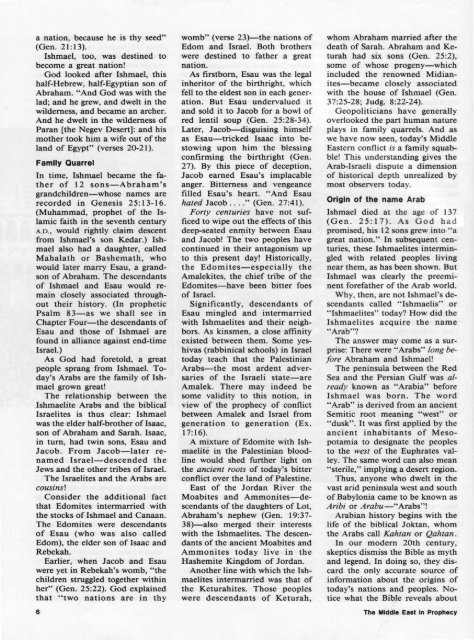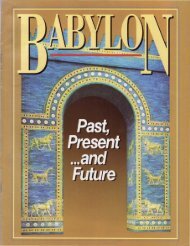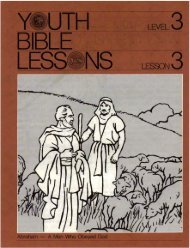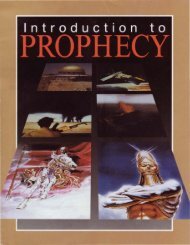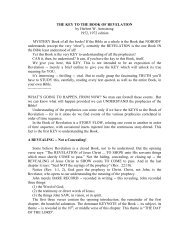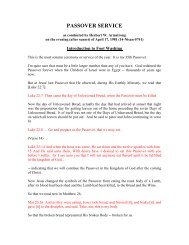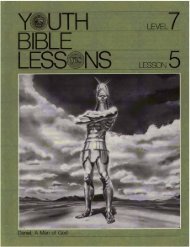Middle East in Prophecy - Church of God - NEO
Middle East in Prophecy - Church of God - NEO
Middle East in Prophecy - Church of God - NEO
Create successful ePaper yourself
Turn your PDF publications into a flip-book with our unique Google optimized e-Paper software.
a nation, because he is thy seed"<br />
(Gen. 21:13).<br />
Ishmael, too, was dest<strong>in</strong>ed to<br />
become a great nation!<br />
<strong>God</strong> looked after Ishmael, this<br />
half-Hebrew, half-Egyptian son <strong>of</strong><br />
Abraham. "And <strong>God</strong> was with the<br />
lad; and he grew, and dwelt <strong>in</strong> the<br />
wilderness, and became an archer.<br />
And he dwelt <strong>in</strong> the wilderness <strong>of</strong><br />
Paran [the Negev Desert]: and his<br />
mother took him a wife out <strong>of</strong> the<br />
land <strong>of</strong> Egypt" (verses 20-21).<br />
Family Quarrel<br />
In time, Ishmael became the father<br />
<strong>of</strong> 12 sons-Abraham's<br />
grandchildren-whose names are<br />
recorded <strong>in</strong> Genesis 25: 13-16.<br />
(Muhammad, prophet <strong>of</strong> the Islamic<br />
faith <strong>in</strong> the seventh century<br />
A.D., would rightly claim descent<br />
from Ishmael's son Kedar.) Ishmael<br />
also had a daughter, called<br />
Mahalath or Bashemath, who<br />
would later marry Esau, a grandson<br />
<strong>of</strong> Abraham. The descendants<br />
<strong>of</strong> Ishmael and Esau would rema<strong>in</strong><br />
closely associated throughout<br />
their history. (In prophetic<br />
Psalm 83-as we shall see <strong>in</strong><br />
Chapter Four-the descendants <strong>of</strong><br />
Esau and those <strong>of</strong> Ishmael are<br />
found <strong>in</strong> alliance aga<strong>in</strong>st end-time<br />
Israel.)<br />
As <strong>God</strong> had foretold, a great<br />
people sprang from Ishmael. Today's<br />
Arabs are the family <strong>of</strong> Ishmael<br />
grown great!<br />
The relationship between the<br />
Ishmaelite Arabs and the biblical<br />
Israelites is thus clear: Ishmael<br />
was the elder half-brother <strong>of</strong> Isaac,<br />
son <strong>of</strong> Abraham and Sarah. Isaac,<br />
<strong>in</strong> turn, had tw<strong>in</strong> sons, Esau and<br />
Jacob. From Jacob-later renamed<br />
Israel-descended the<br />
Jews and the other tribes <strong>of</strong> Israel.<br />
The Israelites and the Arabs are<br />
cous<strong>in</strong>s!<br />
Consider the additional fact<br />
that Edomites <strong>in</strong>termarried with<br />
the stocks <strong>of</strong> Ishmael and Canaan.<br />
The Edomites were descendants<br />
<strong>of</strong> Esau (who was also called<br />
Edom), the elder son <strong>of</strong> Isaac and<br />
Rebekah.<br />
Earlier, when Jacob and Esau<br />
were yet <strong>in</strong> Rebekah's womb, "the<br />
children struggled together with<strong>in</strong><br />
her" (Gen. 25:22). <strong>God</strong> expla<strong>in</strong>ed<br />
that "two nations are <strong>in</strong> thy<br />
6<br />
womb" (verse 23)-the nations <strong>of</strong><br />
Edom and Israel. Both brothers<br />
were dest<strong>in</strong>ed to father a great<br />
nation.<br />
As firstborn, Esau was the legal<br />
<strong>in</strong>heritor <strong>of</strong> the birthright, which<br />
fell to the eldest son <strong>in</strong> each generation.<br />
But Esau undervalued it<br />
and sold it to Jacob for a bowl <strong>of</strong><br />
red lentil soup (Gen. 25:28-34).<br />
Later, Jacob-disguis<strong>in</strong>g himself<br />
as Esau-tricked Isaac <strong>in</strong>to bestow<strong>in</strong>g<br />
upon him the bless<strong>in</strong>g<br />
confirm<strong>in</strong>g the birthright (Gen.<br />
27). By this piece <strong>of</strong> deception,<br />
Jacob earned Esau's implacable<br />
anger. Bitterness and vengeance<br />
filled Esau's heart. "And Esau<br />
hated Jacob .... " (Gen. 27:41).<br />
Forty centuries have not sufficed<br />
to wipe out the effects <strong>of</strong> this<br />
deep-seated enmity between Esau<br />
and Jacob! The'two peoples have<br />
cont<strong>in</strong>ued <strong>in</strong> their antagonism up<br />
to this present day! Historically,<br />
the Edomites-especially the<br />
Amalekites, the chief tribe <strong>of</strong> the<br />
Edomites-have been bitter foes<br />
<strong>of</strong> Israel.<br />
Significantly, descendants <strong>of</strong><br />
Esau m<strong>in</strong>gled and <strong>in</strong>termarried<br />
with Ishmaelites and their neighbors.<br />
As k<strong>in</strong>smen, a close aff<strong>in</strong>ity<br />
existed between them. Some yeshivas<br />
(rabb<strong>in</strong>ical schools) <strong>in</strong> Israel<br />
today teach that the Palest<strong>in</strong>ian<br />
Arabs-the most ardent adversaries<br />
<strong>of</strong> the Israeli state-are<br />
Amalek. There may <strong>in</strong>deed be<br />
some validity to this notion, <strong>in</strong><br />
view <strong>of</strong> the prophecy <strong>of</strong> conflict<br />
between Amalek and Israel from<br />
generation to generation (Ex.<br />
17:16).<br />
A mixture <strong>of</strong> Edomite with Ishmaelite<br />
<strong>in</strong> the Palest<strong>in</strong>ian bloodl<strong>in</strong>e<br />
would shed further light on<br />
the ancient roots <strong>of</strong> today's bitter<br />
conflict over the land <strong>of</strong> Palest<strong>in</strong>e.<br />
<strong>East</strong> <strong>of</strong> the Jordan River the<br />
Moabites and Ammonites-descendants<br />
<strong>of</strong> the daughters <strong>of</strong> Lot,<br />
Abraham's nephew (Gen. 19:37-<br />
38)-also merged their <strong>in</strong>terests<br />
with the Ishmaelites. The descendants<br />
<strong>of</strong> the ancient Moabites and<br />
Ammonites today live <strong>in</strong> the<br />
Hashemite K<strong>in</strong>gdom <strong>of</strong> Jordan.<br />
Another l<strong>in</strong>e with which the Ishmaelites<br />
<strong>in</strong>termarried was that <strong>of</strong><br />
the Keturahites. Those peoples<br />
were descendants <strong>of</strong> Keturah,<br />
whom Abraham married after the<br />
death <strong>of</strong> Sarah. Abraham and Keturah<br />
had six sons (Gen. 25:2),<br />
some <strong>of</strong> whose progeny-which<br />
<strong>in</strong>cluded the renowned Midianites-became<br />
closely associated<br />
with the house <strong>of</strong> ishmael (Gen.<br />
37:25-28; Judg. 8:22-24).<br />
Geopoliticians have generally<br />
overlooked the part human nature<br />
plays <strong>in</strong> family quarrels. And as<br />
we have now seen, today's <strong>Middle</strong><br />
<strong>East</strong>ern conflict is a family squabble!<br />
This understand<strong>in</strong>g gives the<br />
Arab-Israeli dispute a dimension<br />
<strong>of</strong> historical depth unrealized by<br />
most observers today.<br />
Orig<strong>in</strong> <strong>of</strong> the name Arab<br />
Ishmael died at the age <strong>of</strong> 137<br />
(Gen. 25 : 17). As <strong>God</strong> had<br />
promised, his 12 sons grew <strong>in</strong>to "a<br />
great nation." In subsequent centuries,<br />
these Ishmaelites <strong>in</strong>term<strong>in</strong>gled<br />
with related peoples liv<strong>in</strong>g<br />
near them, as has been shown. But<br />
Ishmael was clearly the preem<strong>in</strong>ent<br />
forefather <strong>of</strong> the Arab world.<br />
Why, then, are not Ishmael's descendants<br />
called " Ishmaelis" or<br />
"Ishmaelites" today How did the<br />
Ishmaelites acquire the name<br />
"Arab"<br />
The answer may come as a surprise:<br />
There were "Arabs" long before<br />
Abraham and Ishmael!<br />
The pen<strong>in</strong>sula between the Red<br />
Sea and the Persian Gulf was already<br />
known as "Arabia" before<br />
Ishmael was born. The word<br />
"Arab" is derived from an ancient<br />
Semitic root mean<strong>in</strong>g "west" or<br />
"dusk". It was first applied by the<br />
ancient <strong>in</strong>habitants <strong>of</strong> Mesopotamia<br />
to designate the peoples<br />
to the west <strong>of</strong> the Euphrates valley.<br />
The same word can also mean<br />
"sterile," imply<strong>in</strong>g a desert region.<br />
Thus, anyone who dwelt <strong>in</strong> the<br />
vast arid pen<strong>in</strong>sula west and south<br />
<strong>of</strong> Babylonia came to be known as<br />
Aribi or Arabu-"Arabs"!<br />
Arabian history beg<strong>in</strong>s with the<br />
life <strong>of</strong> the biblical J oktan, whom<br />
the Arabs call Kahtan or Qahtan.<br />
In our modern 20th century,<br />
skeptics dismiss the Bible as myth<br />
and legend. In do<strong>in</strong>g so, they discard<br />
the only accurate source <strong>of</strong><br />
<strong>in</strong>formation about the orig<strong>in</strong>s <strong>of</strong><br />
today's nations and peoples. Notice<br />
what the Bible reveals about<br />
The <strong>Middle</strong> <strong>East</strong> In <strong>Prophecy</strong>


